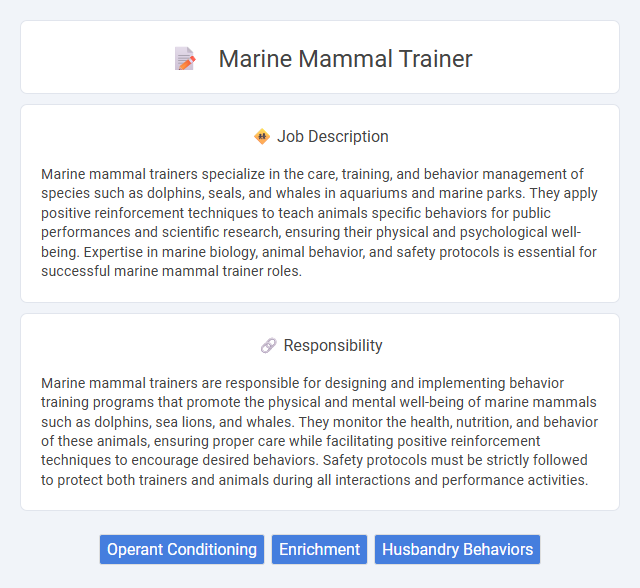
Marine mammal trainers specialize in the care, training, and behavior management of species such as dolphins, seals, and whales in aquariums and marine parks. They apply positive reinforcement techniques to teach animals specific behaviors for public performances and scientific research, ensuring their physical and psychological well-being. Expertise in marine biology, animal behavior, and safety protocols is essential for successful marine mammal trainer roles.
Individuals with strong physical stamina and a passion for working closely with animals are likely suited for a marine mammal trainer job, as the role often involves performing repetitive tasks and handling large marine animals in varying weather conditions. Candidates who possess patience, excellent communication skills, and a willingness to continually learn behavioral training techniques may find this profession satisfying and rewarding. Those prone to allergic reactions, fear of water, or difficulty maintaining consistent routines may have challenges adapting to the demanding nature of this career.
Qualification
Marine mammal trainer positions typically require a bachelor's degree in marine biology, animal science, or a related field to ensure a strong foundation in animal behavior and physiology. Hands-on experience through internships or volunteering at aquariums, marine parks, or research facilities is essential for developing practical training skills. Certification in CPR and first aid, along with physical fitness and excellent communication abilities, are also highly valued qualifications in this profession.
Responsibility
Marine mammal trainers are responsible for designing and implementing behavior training programs that promote the physical and mental well-being of marine mammals such as dolphins, sea lions, and whales. They monitor the health, nutrition, and behavior of these animals, ensuring proper care while facilitating positive reinforcement techniques to encourage desired behaviors. Safety protocols must be strictly followed to protect both trainers and animals during all interactions and performance activities.
Benefit
Marine mammal trainers likely enjoy the benefit of working closely with animals in unique and enriching environments that foster personal and professional growth. The job probably offers opportunities for career advancement within aquariums, marine parks, or research institutions. Competitive compensation and benefits packages may also be available, including healthcare and chances for continued education in marine biology or animal behavior.
Challenge
Marine mammal trainer roles likely involve significant challenges related to ensuring animal welfare while effectively teaching complex behaviors. The probability of encountering unpredictable marine mammal behavior may require trainers to adapt techniques rapidly and maintain high safety standards. Managing these challenges successfully often demands a combination of patience, expertise, and continuous learning.
Career Advancement
Marine mammal trainers gain valuable hands-on experience working with dolphins, seals, and whales, which serves as a foundation for career advancement into roles like senior trainer or marine mammal behaviorist. Expertise in animal behavior, positive reinforcement techniques, and animal welfare increases opportunities for leadership positions at aquariums, marine parks, or research institutions. Continuing education in marine biology and certifications in animal training further enhance prospects for specialized roles, including veterinary assistant or marine conservation coordinator.
Key Terms
Operant Conditioning
Marine mammal trainers specialize in operant conditioning techniques to shape and reinforce desired behaviors in animals such as dolphins, seals, and whales. They use positive reinforcement methods, including rewards like fish and praise, to encourage animals to perform specific tasks or participate in health and enrichment activities. Mastery of operant conditioning facilitates effective communication between trainers and marine mammals, ensuring animal welfare and successful training outcomes.
Enrichment
Marine mammal trainers develop and implement enrichment programs to stimulate the physical and mental well-being of dolphins, sea lions, and whales. These programs include interactive toys, puzzles, and varied training sessions designed to simulate natural behaviors and reduce stress. Consistent enrichment enhances animal health, promotes natural instincts, and improves overall performance in marine parks and research facilities.
Husbandry Behaviors
Marine mammal trainers specialize in husbandry behaviors such as monitoring health, administering medications, and assisting with medical examinations. They use positive reinforcement techniques to encourage cooperation during routine care, ensuring animals remain stress-free. Proficiency in behavioral conditioning and detailed record-keeping is essential for maintaining optimal animal welfare.
 kuljobs.com
kuljobs.com